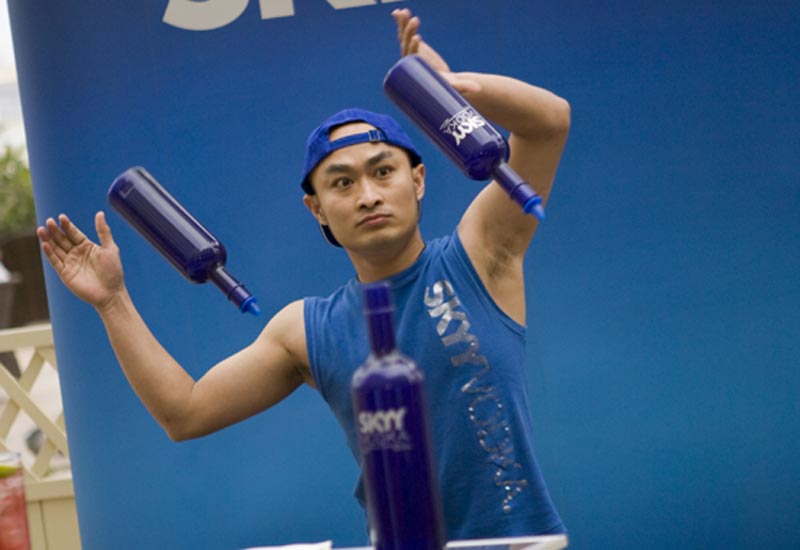Kaba: I personally find that top management is always against flair, but other challenges in this region are a lack of available training and the previous absence of a flair competition.
McGregor: I think like anywhere its simply general acceptance. Lots of the operators are fully GP-driven, so anything that involves risk of spillage or breakage is almost instantly a no-no!
They have to look past the accounts and see the draw factor of something like this. Not only that, but they have to allow some creative freedom to their staff. Too many places have this entire ‘follow the company ethos or nothing else’ policy, basically asking their staff to be puppets rather than individuals and entertainers.
They need to appreciate the fact that, if managed in the correct way, staff can bring a lot more to the table which ultimately is beneficial to the outlet – but to achieve this, they must be allowed the freedom to get there.
Why do you think flair is an important component of today’s bar industry?
Kahawaty: Of course it depends of the concept, but in my opinion as a barmanager and flair bartender, night clubs or clubs or lounge bars without any action just look dead.
And guests enjoy entertainment - they like to see showmanship.
Nijs: It is a way to mark an accomplishment in the profession, one of the ways to clearly set the difference between a ‘barman’ and a ‘bartender’. It highlights your development within the industry – along with a couple of other types of events. Today’s bartender must be able to mix, to flair, to make coffee and to know about his spirits. Usually, flairing is the first stage of developing a bartender.

| Advertisement |
Kaba: It attracts the crowd at the bar to drink more as well, and can encourage them to try products which perhaps don’t usually sell that well.
McGregor: I think, as a number of people have said before, that people are always looking for something different and a little more interesting. Flair is one of those things that is great entertainment and which creates an attraction within itself. If it’s done right, it can be a huge crowd-puller - however if it’s done badly it can really annoy the guests, not to mention managers and people concerned with your GP’s.
I don’t think flair is the only element of the bar industry that we should be focusing on, far from it, but if a bartender can mix properly and has flair as another string to their bow then more power to them. Why not show what you can do!
What do you think would encourage hotels to include a flair experience in some capacity in their bars?
Kahawaty: Guest always need entertainment, plus flair will increase guest spending because it will incite them to stay there and try more new things - but over all it should of course always be conducted in a proper, organised, responsible manner.
Nijs: First, they would need to set their bars up properly. As an external consultant, I have often had operators coming up to me and say ‘I want flair in my bar’, however the basic understanding of the dynamics behind this skills are completely lacking.
Bartenders also have to make a point that spillage is not acceptable, and flairing does not entail wastage - a key issue for hotels, as most are looking at lowering their beverage cost.
Kaba: More flair competitions would be good – and I think we’re making a start this year, with the re-launch of the competition at Apres in Dubai.
McGregor: Proper training would be a start, to show them that flair is not just randomly throwing bottles about the place and hoping for the best. I think ignorance of what proper flair is remains a problem, but I think if we are fair we are partly to blame for that. As much as watching well-trained guys go at it behind a bar is great, how many times have you seen guys who have no clue also trying to flair? The end result is disaster. If we want flair to grow here, bartenders need to learn in the correct environment and then only bring it to work when they are ready and able to do so.









 Search our database of more than 2,700 industry companies
Search our database of more than 2,700 industry companies









